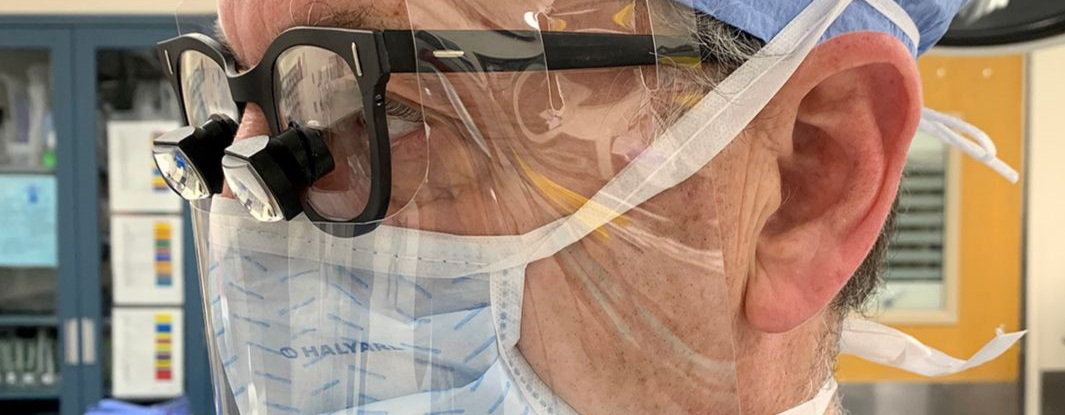The Surgical Shield Design is available for commercial licensing through the University of Wisconsin-Madison’s technology transfer partner, Wisconsin Alumni Research Foundation (WARF). WARF is providing a time-limited royalty free license to companies to help facilitate rapid deployment of the shield to help address the health crisis.
On a spring day in 2020, in an operating room in Madison, Michael Bentz, M.D., and his chief resident were performing cancer reconstruction on a patient.
For seven hours “we were literally forehead to forehead,” says Dr. Bentz, a surgeon in the Division of Plastic Surgery at the University of Wisconsin School of Medicine and Public Health.
Then, his colleague tested positive for COVID-19 and became symptomatic. Soon, Dr. Bentz himself came down with the disease and quarantined. Both recovered, but “it made me think – how can we prevent this from happening again?”
The imperative to conserve personal protective equipment (PPE) was one challenge. The other was finding a face mask that could accommodate a surgeon’s tools, including specialized magnifying glasses (i.e., loupes), cameras and headlights.
No existing product fit the bill. He connected with the engineers at UW Makerspace. Their challenge: collaborate to rapidly prototype a new design.
“I think [Dr. Bentz] sent us a picture of a Hannibal Lecter mask,” recalls Karl Williamson, shop manager at UW Makerspace. “He said ‘I need something like this, but clear.’”
Iterations passed between surgeon and engineers. The constraints were many: headlights get hot and melt plastic; clip-ons aren’t sterile; fogging is forbidden.
“It was about three weeks of me driving back and forth, parking my car illegally, running up to a box outside Makerspace’s office and running back,” Bentz recalls.
The final design – thin, trimmable and customized – was approved for use by UW Health’s Hospital Incident Command. By the middle of 2020, some 225 surgical shields had been die cut by UW’s DoIT Digital Publishing and Printing Services (DPPS) for attending surgeons, residents and other staff in UW Health operating rooms. It is also available for commercial licensing through WARF.
“WARF works to help facilitate the transfer of innovations off of UW’s campus and we are privileged to be able to help Dr. Bentz and the team at UW Makerspace make this important design available to others working to provide quality healthcare while maintaining the safety of the staff and patients,” says Jeanine Burmania, senior director of IP & Licensing at WARF. “We have created a license that minimizes any hurdles to licensing during the COVID pandemic and provides opportunity for future use.”
Even as COVID-19 vaccinations begin to ramp up, Bentz sees the continued utility of their invention, including in other fields such as dentistry.
“The reality is, if it’s not COVID-19, it’s going to be something else and this won’t go away completely,” he says. “Everyone is still concerned about transmission and being protected, and not losing workdays.”
He adds, “I don’t consider myself an inventor or any of that. My goal was just to create something that would protect people.”
“The product design is quite simple—a plastic sheet with a few holes,” Williamson of UW Makerspace told campus news. “But it took many connections, tools, and skill sets to bring it together…The whole process was a mini-exercise in user-centered design that requires all of these stakeholders.”
“Being on a university campus is awesome,” Bentz says. “This would have been a lot more challenging in a private environment. That’s the benefit of being in a place where you have high level collaborators and colleagues who are willing to engage.”
The Face Shield was designed, engineered, and tested at University of Wisconsin-Madison in collaboration with the UW Makerspace, the University of Wisconsin-Madison College of Engineering and UW–Madison DPPS. The Face Shield has been approved for use by UW Health.
